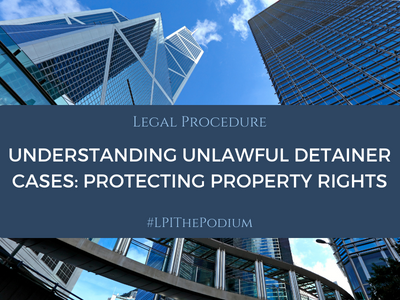
Unlawful detainer cases, often referred to as eviction proceedings, are a legal process designed to protect the rights of property owners and landlords while ensuring fair treatment for tenants. This legal action allows a landlord to regain possession of their property when a tenant remains on the premises without the legal right to do so.
The crux of an unlawful detainer case revolves around the concept of possession. A landlord initiates legal action when a tenant violates the lease agreement or rental contract by overstaying their tenancy, refusing to leave after the lease has expired, or engaging in activities that breach the terms of the agreement. Common reasons for eviction include failure to pay rent, property damage, illegal activities, or violating specific lease clauses.
To begin the process, landlords typically issue a notice to the tenant, formally demanding that they vacate the property within a specified time frame. If the tenant fails to comply, the landlord can then file an unlawful detainer lawsuit in a civil court. The court will examine the evidence presented by both parties and render a judgment based on the merits of the case.
For tenants, unlawful detainer cases can have serious consequences, including eviction from their homes and potential damage to their rental history. However, these cases also offer tenants an opportunity to present a defense if they believe they have not breached the lease or that the eviction is unjust.
Unlawful detainer cases are vital for maintaining a balanced landlord-tenant relationship and upholding property rights. For landlords, it provides a legal framework to reclaim their property and mitigate potential financial losses. Simultaneously, for tenants, it emphasizes the importance of understanding and complying with lease agreements to ensure a secure and stable living arrangement.
In conclusion, unlawful detainer cases serve as a necessary legal tool to safeguard the rights of both landlords and tenants. They underline the significance of adhering to lease agreements and highlight the importance of resolving disputes through a fair and transparent legal process.
Categorized in: Legal Procedure
| << previous | next >> |








